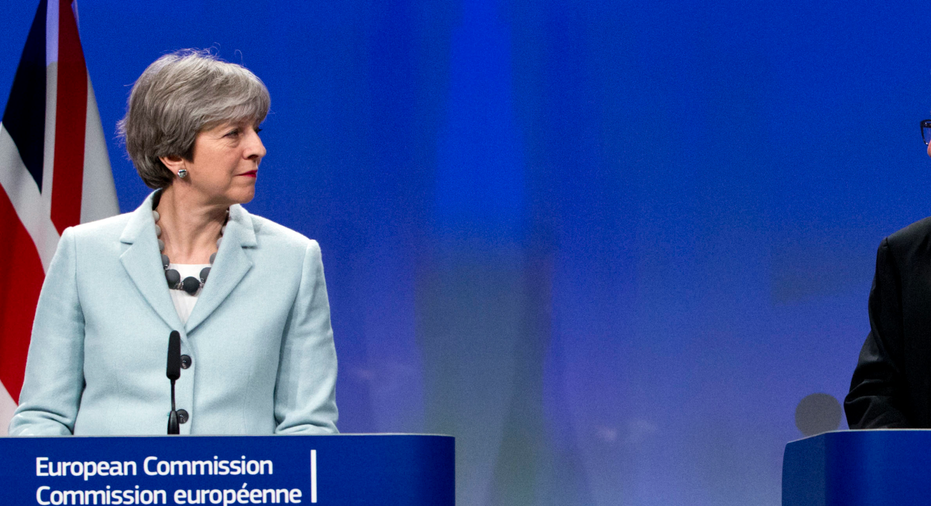UK, EU hail Brexit breakthrough despite unresolved questions

BRUSSELS – Britain and the European Union hailed a breakthrough Friday that allows them to begin talks on their post-Brexit relations without answering some key questions about how their divorce will play out.
With pressure building on British Prime Minister Theresa May's fragile government, the sides agreed on the last sticking point in Britain's divorce terms: the border between EU member Ireland and the United Kingdom's Northern Ireland.
They both accepted that the border must remain open once Britain leaves the bloc in 2019, although they left it unclear how that would happen in practice. After a hectic night of phone diplomacy, the Northern Ireland party blocking a deal __ and propping up May's Conservative government — said it was satisfied.
Negotiators also reached a broad agreement on the other divorce terms, which the EU had required before it would allow the talks to move on to the weighty questions of future relations, including trade, which had been keeping businesses and financial markets on edge.
The sides agreed on the rights of both British citizens in EU countries and EU nationals in the U.K. The also ironed out the terms of Britain's financial obligations to the bloc, which could total some 50 billion euros ($59 billion), though the exact size of the bill cannot be calculated.
Just after dawn, with the British flag flying outside its headquarters, the EU's executive body, the European Commission, said it was finally satisfied with May's proposals and recommended that the talks move to the next phase. Leaders of Britain's 27 EU partner countries are expected to ratify that decision at a meeting on Thursday in Brussels.
"I believe that we have now made the breakthrough that we needed," Commission President Jean-Claude Juncker said during a news conference with May. EU lawmakers, who must ratify any full Brexit agreement, also endorsed the deal.
The arrangement buys time, particularly for May's government, which EU negotiators have complained of being indecisive in what it wants amid an internal fight over the direction the country should take.
A majority of British voters decided 18 months ago to leave the EU, but this first phase of talks — focused on preliminary issues that many had expected to be resolved quickly — has dragged on amid disputes over the divorce bill and the Irish border.
A final Brexit agreement must be found by next autumn, to leave time for national European parliaments to endorse it.
If EU leaders endorse this deal, Brexit negotiations are likely to resume in early January, officials say.
Still, the first phase is not really over. Friday's deal seems to simply delay decisions on some key points, including how to keep the Irish border open.
Britain is promising to withdraw from the European tariff-less single market and customs union while saying there will be no hard border between Ireland and Northern Ireland — although the former will remain within the EU single market and the latter in the U.K.
So complex are the issues — and couched in such vague language in Friday's deal — that experts will try to resolve the contradictions in a separate strand of talks over the 10 months of negotiating time that remains.
Even the European Commission acknowledged the size of the challenge in a report to EU leaders that said the wording "seems hard to reconcile with the United Kingdom's communicated decision to leave the internal market and the Customs Union."
The parties involved in the agreement appear satisfied, for now.
"I very much welcome the prospect of moving ahead to the next phase, to talk about trade and security and to discuss the positive and ambitious future relationship that is in all of our interests," May said.
Ireland's prime minister, Leo Varadkar, welcomed the compromise as a step in the right direction, saying "this is not the end but it is the end of the beginning."
EU heavyweights Germany, France and Spain also cautiously welcomed the Brexit developments, while warning that perhaps the most difficult negotiations lie ahead.
Those further from the talks were angry.
Nigel Farage, who led the drive to leave the EU as head of the U.K. Independence Party, said May had caved on critical points. Farage tweeted that the deal was "good news for Mrs. May as we can now move on to the next stage of humiliation."
On the other side, anti-Brexit London Mayor Sadiq Khan said it is "extremely disappointing" that Britain is pledging to leave the single market and customs union.
"Despite the progress today, it looks increasingly unlikely that we will get a deal that works in London's best interests and protects jobs and growth across Britain," he said.
Already, precious time has been lost. The real drama — sketching out future ties, the parameters of a trade agreement and fixing the outstanding divorce issues — lies ahead.
European Council President Donald Tusk, who will chair next Thursday's summit, grimly pointed out that 18 months have passed since Britain voted to leave the EU, yet the hardest work must still be done.
"So much time has been devoted to the easier part of the task and now to negotiate a transition arrangement and the framework for our future relationship we have de-facto less than a year," Tusk said.
"We all know that breaking up is hard, but breaking up and building a new relation is much harder," he said.
___
Lawless reported from London. Danica Kirka contributed to this report.



















